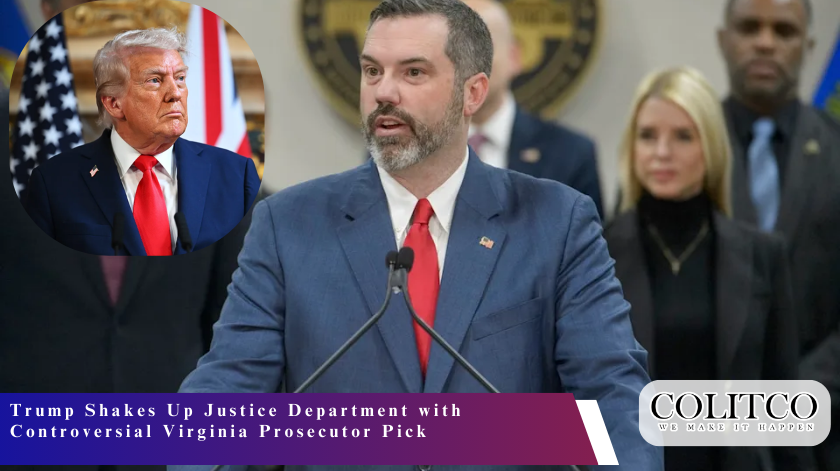trump-shakes-up-justice-department President Donald Trump has nominated White House aide Lindsey Halligan to lead one of America’s most influential federal prosecutor offices, sparking fresh debate about political loyalty versus prosecutorial independence.
The appointment comes after a dramatic weekend that saw Trump fire the previous Virginia U.S. Attorney for refusing to bring charges against political opponents.
Halligan Steps Into Political Firestorm
Trump announced Saturday he would nominate Halligan as U.S. Attorney for the Eastern District of trump-shakes-up-justice-department Virginia, praising her as a “tough, smart, and loyal attorney” who would provide “desperately needed, JUSTICE FOR ALL.“
The timing couldn’t be more significant. Erik Siebert, the previous interim U.S. Attorney, resigned Friday trump-shakes-up-justice-department under intense pressure from Trump administration officials to prosecute New York Attorney General Letitia James for alleged mortgage fraud.
Halligan’s nomination represents Trump’s determination to install trusted allies in key Justice Department positions. She trump-shakes-up-justice-department currently serves as a special assistant to the president and previously defended Trump during the Mar-a-Lago classified documents investigation.
The Siebert Controversy trump-shakes-up-justice-department trump-shakes-up-justice-department Explained
Siebert’s departure followed months of pressure to bring criminal charges against James, despite investigators finding trump-shakes-up-justice-department insufficient evidence to secure a conviction.
The investigation centered on allegations that James provided false information on mortgage applications for better loan rates on a Virginia property. However, after interviewing 15 witnesses over five months, prosecutors couldn’t establish clear evidence of intentional fraud.
Trump’s frustration boiled over Friday when he told reporters he wanted Siebert “out” of the position. Later,trump-shakes-up-justice-department Trump disputed reports that Siebert resigned, declaring on Truth Social: “He didn’t quit, I fired him!“
Who Is Lindsey Halligan?
Halligan brings an unusual background to the prestigious Virginia prosecutor role. Unlike typical U.S. trump-shakes-up-justice-department Attorney nominees, she lacks federal prosecution experience.

Her career began as an insurance attorney in Florida before joining Trump’s legal orbit. She gained national attention in 2022 when she joined Trump’s defense team during the FBI’s Mar-a-Lago raid investigation.
Currently, Halligan works in the White House reviewing government programs and cultural institutions for alignment with administration priorities. Her nomination signals Trump’s preference for personal loyalty over traditional prosecutorial credentials.
Strategic Importance of Eastern District
The Eastern District of Virginia, known as the “rocket docket” for its swift case handling, prosecutes some of America’s most sensitive matters. The office handles terrorism cases, high-stakes political investigations, and national security prosecutions.
As U.S. Attorney, the appointee oversees approximately 300 staff across four divisions in Alexandria, Richmond, Norfolk, and Newport News.
The position’s strategic value explains why Trump moved quickly to install a loyalist. Ongoing investigations include matters related to the Russia investigation and other politically sensitive cases.
Political Reactions Pour In
Virginia’s Democratic senators, Mark Warner and Tim Kaine, condemned the move in a joint statement, describing Siebert as “an ethical prosecutor who refused to bring criminal charges against Trump’s perceived enemies when the facts wouldn’t support it.”
Critics argue Halligan’s appointment prioritises political loyalty over legal expertise. Supporters counter that fresh leadership is needed to restore accountability to federal prosecutions.
Trump will nominate senior aide Lindsey Halligan – who was previously censoring art at the Smithsonian – to serve as the top federal prosecutor for the VA office after Erik Siebert was ousted for refusing to charge Letitia James.
Her qualifications? She follows orders. pic.twitter.com/5NnOOLMs7E
— Amee Vanderpool (@girlsreallyrule) September 22, 2025
Legal experts express concern about politicising the Justice Department, while Trump allies celebrate what they see as necessary reform of a biased system.
Broader Justice Department Reshuffling
The Halligan nomination fits Trump’s broader pattern of appointing trusted figures to key legal positions. The administration has systematically replaced prosecutors viewed as insufficiently loyal.
The move follows similar pressure campaigns against other Trump adversaries, including investigations targeting Senator Adam Schiff and Federal Reserve Governor Lisa Cook.
Mary “Maggie” Cleary was briefly named acting U.S. Attorney Saturday before Trump announced Halligan’s nomination, highlighting the administration’s urgency to fill the position.
Senate Confirmation Ahead
Halligan must now navigate Senate confirmation hearings where her qualifications and independence will face scrutiny. Democrats are likely to question her prosecutorial experience and relationship with Trump.
Republicans may rally behind her nomination, framing it as necessary reform of what they consider a weaponised Justice Department.
The confirmation process will test whether Trump’s influence extends to securing Senate approval for controversial appointments.
Also Read: Platina Resources Divests Xanadu Project to Focus on Mt McKenna Gold Project Growth
Final Thoughts
The Halligan nomination represents a pivotal moment testing the balance between political loyalty and prosecutorial independence. Her confirmation could reshape federal law enforcement for years to come.
As this story develops, the implications extend far beyond Virginia, potentially affecting how justice is administered across America’s federal courts.
FAQs
Q: What experience does Lindsey Halligan have as a prosecutor?
A: Halligan has no federal prosecution experience. She worked as an insurance attorney before joining Trump’s legal team and later the White House staff.
Q: Why was Erik Siebert fired?
A: Trump removed Siebert after he refused to prosecute political opponents, specifically declining to charge Letitia James due to insufficient evidence.
Q: What cases does the Eastern District of Virginia handle?
A: The office prosecutes terrorism, national security cases, political investigations, and other high-profile federal matters.












